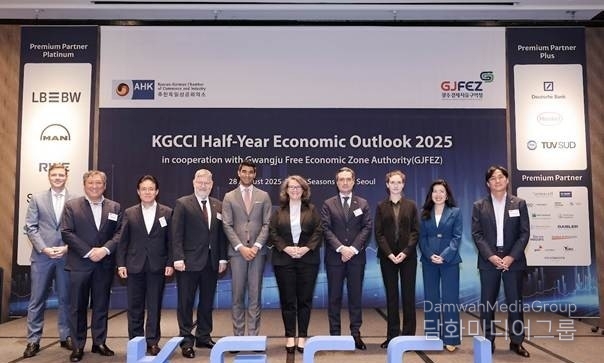By Diplomacy Journal Lee Kap-soo
The Korean-German Chamber of Commerce and Industry (KGCCI, President & CEO Marie Antonia von Schönburg), in cooperation with the Gwangju Free Economic Zone Authority, held the KGCCI Half-Year Economic Outlook 2025 on August 28 at the Four Seasons Hotel.
The event, organized to provide exclusive insights into the developments of Korean-German business relations in these challenging times, drew the participation of more than 80 key officials, business leaders and experts from Korean and German companies and institutions.

Speakers included Joern Beissert, Deputy Head of Mission at the German Embassy to South Korea; Juliana Lee, Asia Chief Economist at Deutsche Bank; and Katharina Viklenko, Director and Correspondent Korea at Germany Trade & Invest (GTAI).
Hyun-Nam Park, Korean Chairperson of KGCCI & Chief Country Officer of Deutsche Bank Group Korea, stated, “South Korea’s economy showed resilience with 0.6% growth in the second quarter. Now, with easing inflation and a new U.S. trade deal, policymakers and businesses have fresh breathing room. Korea remains a dynamic market for German companies, and KGCCI is committed to turning this momentum into stronger Korean-German business relations.”
Beissert, who spoke about political outlook in German-Korean bilateral relations, said, “Despite new governments in Germany and Korea, we remain close partners facing similar challenges. Germany is committed to strengthening this partnership further and to deepening cooperation in many new fields.”
Katharina Viklenko, Director and Correspondent Korea of GTAI, presenting on “Economic Outlook for Korea,” noted: “South Korea’s GDP growth in 2025 is projected to hover around 1 percent, marking its weakest performance since the Covid-19 pandemic. High household debt, weak construction investment and global trade tensions are dampening domestic demand and exports. Key industries like automobiles and electronics are expected to face higher costs due to U.S. tariffs on Korean imports.”
Meanwhile, Juliana Lee, Asia Chief Economist at Deutsche Bank, kicked off her global economic outlook presentation and noted that “Asia is actively seeking strategic solutions to avoid trade-constrained slowdown, while pre-emptively employing macro policy to smooth its cyclical path.”
Lastly, David Jones, Country Manager of RWE Renewables Korea, Byung-Hee Glugla, Head of Sales and Handling, Lufthansa Cargo, and Marcello Lusuardi, President & CEO of Robert Bosch Korea, discussed perspectives of their respective industry sectors during a panel discussion moderated by Felix Kalkowsky, Vice President of KGCCI.







